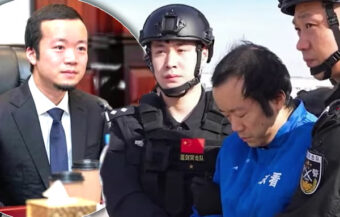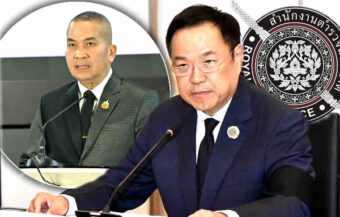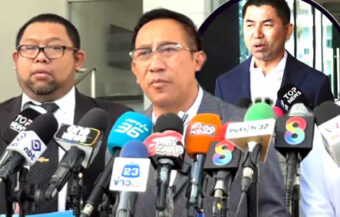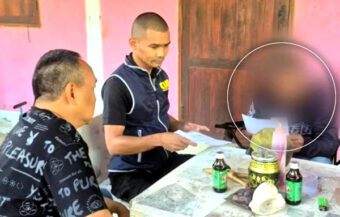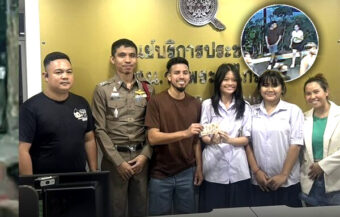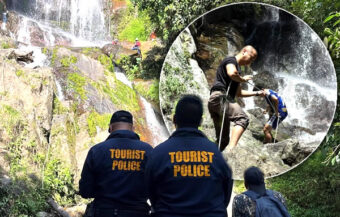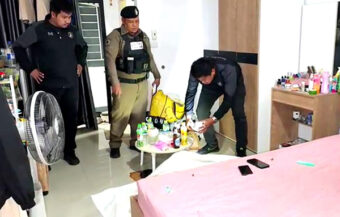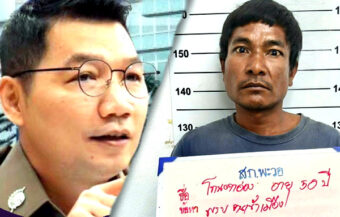PM Anutin demands top minister provide a full written explanation over alleged illicit funds links, as a former official claims Hun Sen deliberately triggered the Thai-Cambodian border war to protect multi-billion-dollar criminal syndicates operations.
After meeting the American ambassador on Tuesday, Prime Minister Anutin Charnvirakul struck a defiant tone, vowing to crush Cambodian scam networks infiltrating Thailand. “We are investigating everyone,” he said, confirming he had demanded a written explanation from Deputy Finance Minister Woraphak Thanyawong over opposition claims. The statement came as former government official Chai Wachirong alleged that orders by ex-premiers Thaksin and Paetongtarn Shinawatra had provoked Cambodian leader Hun Sen to move against Thailand. Hun Sen, now reportedly allied with China’s 14K triad, is accused of protecting Cambodia’s billion-dollar scam compounds by engineering the border conflict to shield the lucrative criminal empire for a price remitted to his regime.
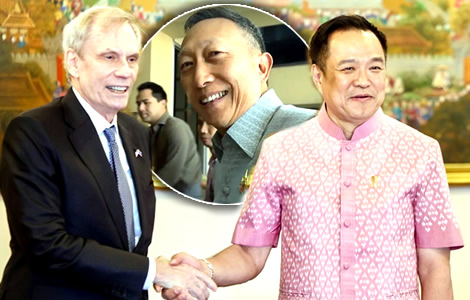
Cracks are now clearly appearing in Thailand’s political and security walls as Prime Minister Anutin Charnvirakul moves to confront Cambodia-linked scam operations head-on. The government’s patience with entrenched cross-border cybercrime appears to have finally run out.
After weeks of political unease and growing opposition pressure, Anutin has taken direct command. His latest moves signal not only determination but also a willingness to risk political capital to fight powerful networks that have penetrated both the private and public sectors.
Over the weekend, the Prime Minister held a series of tense meetings. By Monday, a decisive security committee session set the tone for a national crackdown. Then, on Tuesday, Anutin made it official. He declared that Thailand would no longer tolerate criminal infiltration or bureaucratic complacency.
Anutin orders deputy finance minister to explain claims amid growing pressure from opposition parties
At that cabinet meeting on Tuesday, he ordered Deputy Finance Minister Woraphak Thanyawong to provide a written explanation. The directive followed recent allegations linking Woraphak to financial networks possibly tied to illegal funds. The claims had been aired by People’s Party MP Rangsiman Rome and several opposition members, demanding immediate transparency.
According to government insiders, Anutin’s instruction was blunt and uncompromising. He told reporters that every allegation would be investigated and that “no one is untouchable.” He further insisted that political convenience would not protect anyone implicated in cyber scams or grey money operations.
Moreover, he reminded the cabinet that the fight against online fraud must be treated as a national priority. “If anyone is found guilty, we will act immediately,” he said. His message was clear: accountability would not stop at political rank or family name.
Earlier, Deputy Minister of Finance Woraphak had told the Prime Minister he was planning to issue a social media post and hold a press conference to robustly counter the claims made against him. However, this course of action was suggested by Prime Minister Anutin as a more appropriate course of action.
Prime Minister clarifies oversight and affirms national authority over all cybercrime investigations
At the same time, Anutin dismissed rumours that Finance Minister Ekniti Nitithanprapas had asked Woraphak to head a new financial tracing committee. He said investigations into call centre and scam gang finances are under the direct jurisdiction of the Ministry of Justice. “There will be one command chain,” he stressed. “We cannot afford confusion when the nation’s credibility is at stake.”
The Prime Minister also confirmed that authorities are reviewing several citizenship cases involving individuals linked to scam networks. “Revocation of citizenship is being considered,” he said, adding that the list includes both Thai and foreign nationals who have acted against the state’s interests. When pressed by reporters about names connected to Cambodia’s Prince Holding Group, Anutin’s answer was simple: “We are investigating everyone.”
Later that afternoon, Anutin met U.S. Ambassador Robert F. Godec at Government House. The conversation, described as “strategic and candid,” centred on joint efforts to dismantle cybercrime networks spanning Thailand, Cambodia, and Myanmar. Both sides agreed that online scams and financial fraud now pose a transnational threat requiring coordinated suppression.
Thailand and United States confirm joint strategy to combat Cambodian scam networks and organised crime
Government spokesperson Siripong Angkasakulkiat briefed the media after the meeting. He said the Prime Minister reaffirmed Thailand’s four-point stance on Cambodia and urged Phnom Penh to act “with sincerity and transparency.” The U.S., meanwhile, reaffirmed its role as an observer in upcoming border and diplomatic negotiations.
During the talks, Anutin also approved a plan to share scammer network databases with U.S. enforcement agencies. The aim is to enhance tracking, coordination, and prosecution of cross-border criminal syndicates. A delegation of American cybercrime experts will arrive in early November to finalise operational guidelines and begin direct cooperation.
Siripong added that both sides had agreed on a practical agenda. “The Prime Minister wants tangible results,” he said. “The U.S. has the technology and expertise. Thailand has the field intelligence. Together, we can dismantle the scam networks that are damaging both economies.”
International analysts say the scale of these scams is staggering. Hundreds of billions of baht are siphoned from victims each year through complex online frauds based in Cambodian border towns such as Poipet and Sihanoukville. Many victims of trafficking are forced to work in call centres under armed guard.
Thai authorities face entrenched criminal networks backed by regional elites and Chinese mafia links
Thai law enforcement agencies have rescued hundreds of citizens trapped in these compounds. However, the operations remain difficult. Many facilities are controlled by powerful groups tied to local elites. Western intelligence officials believe these groups are closely connected to Chinese triads and other transnational crime syndicates.
Despite repeated warnings from Washington and London, Cambodia has been slow to take decisive action. Officials in Phnom Penh continue to deny any state involvement. Yet evidence collected by the FBI and Interpol indicates that several Cambodian conglomerates—including the Prince Group—have been under scrutiny for laundering scam profits through real estate and casino fronts.
Against this tense backdrop, Thailand’s domestic political scene has been shaken by revelations involving former Prime Minister Thaksin Shinawatra. On Tuesday, former government spokesman Chai Wachirong released new information on the social media platform X, including a controversial audio clip of Thaksin discussing call centre gangs.
Thaksin audio clip exposes alleged Chinese-led scams and links to Cambodia’s criminal network
The clip features Thaksin claiming that Chinese nationals are the masterminds behind major scam networks operating across Thailand and Myanmar. “They live in apartments worth billions,” he said. “Three people, three billion baht, in Bangkok alone. We’re collecting evidence and linking them all together.”
He went on to describe earlier police investigations into a 25-storey building used as a call centre hub. “We found Thais being detained and forced to work,” he said. “The operation was stealing Thai money through Cambodia’s criminal networks.”
Thaksin also named “Hui Van,” a company reportedly on the U.S. blacklist, alleging that it laundered huge amounts of money through complex offshore structures. He claimed that one of its major shareholders is “Hun To,” the nephew of Cambodian leader Hun Sen.
Shortly after posting the clip, Chai added his interpretation. He alleged that Thaksin’s remarks “kicked Hun Sen’s biggest black and grey rice pot,” referring to the Cambodian leader’s alleged financial links to the scam industry. According to Chai, Hun Sen then worked with Thaksin’s political rivals to create tension along the Thai-Cambodian border.
Border incidents allegedly staged to protect Cambodian scams and manipulate political narrative in Thailand
“The border incidents were not random,” Chai wrote. “They were staged to protect scam interests in Cambodia and to distract from mounting pressure.” He further claimed that the so-called border war was designed to appear as a family feud between political dynasties, rather than a calculated ploy to shield transnational crime.
“This is not about politics,” Chai concluded. “It’s about protecting scam empires. The only way to solve the border crisis is to destroy the scam operations completely.”
His statements quickly ignited debate online. While unverified, they underline growing concern that criminal syndicates have become deeply embedded in regional power structures. Analysts say the new information reinforces why Thailand is seeking closer cooperation with the U.S. and other allies.
Indeed, Western intelligence agencies have long warned that Southeast Asia’s scam compounds have evolved into hybrid zones of crime, money laundering, and human trafficking. Many employ thousands of workers, both voluntary and coerced, to defraud victims worldwide. The networks are backed by sophisticated technology and shielded by political patronage.
Anutin personally leads the anti-cybercrime task force, signalling decisive government action is planned
For Thailand, the challenge is immense. Yet Anutin appears determined to reclaim control. His personal leadership of the national anti-cybercrime committee is widely viewed as a signal that the government will not delegate responsibility.
Officials close to the Prime Minister say his approach combines diplomacy, enforcement, and international cooperation. “He wants results, not headlines,” one senior aide said. “He’s aware that Thailand’s credibility depends on how we handle this crisis.”
Observers note that the U.S. has taken a keen interest in Thailand’s efforts. Washington views the Mekong region as a flashpoint for cyber-enabled financial crimes. By joining forces with Bangkok, American agencies hope to target both the financial networks and the technology infrastructure behind the scams.
Thai authorities tighten surveillance on financial flows as public outrage over international scams grows
Meanwhile, Thai authorities are tightening surveillance on money flows across the border. Banks, fintech firms, and digital platforms are being required to report suspicious transfers more aggressively. According to the Digital Economy Ministry, new data-sharing protocols will soon connect Thai banks directly with U.S. and British anti-fraud databases.
Public sentiment, however, remains volatile. Many Thais are outraged that scam networks operating from Cambodia continue to exploit Thai citizens. Victims’ families have, at the same time, flooded social media with pleas for action. “We want justice and accountability,” one victim’s father said this week. “Our children were tricked, sold and enslaved.”
High powered, secretive meeting chaired by PM agrees robust action against Cambodian networks
Thailand and Cambodia face danger from ‘Dragon Head’ the Chinese mafia leader behind the scams
Cambodia lashes out at Anutin’s call to South Korean President Lee Jae-myung as internal interference
Cyber police and Money Laundering agency seek UK and US co-operation targeting Cambodian networks
As pressure mounts, Anutin’s government faces a defining moment. The Prime Minister must deliver both justice and stability while proving that Thailand can lead the region in dismantling organised cybercrime. His actions over the coming weeks—especially the November summit with U.S. officials—may determine whether the country reclaims control or remains entangled in a criminal web stretching from Phnom Penh to Bangkok.
The stakes could not be higher. If Thailand, however, succeeds, it will certainly restore faith in regional governance and show that cross-border crime can be confronted through transparency and resolve. If it fails, the scam empire now spreading across Southeast Asia will only grow stronger—at the expense of ordinary citizens, national integrity and international trust.
Join the Thai News forum, follow Thai Examiner on Facebook here
Receive all our stories as they come out on Telegram here
Follow Thai Examiner here
Further reading:
High powered, secretive meeting chaired by PM agrees robust action against Cambodian networks
Thailand and Cambodia face danger from ‘Dragon Head’ the Chinese mafia leader behind the scams
Cyber police and Money Laundering agency seek UK and US co-operation targeting Cambodian networks
United States, South Korea and United Kingdom act against Cambodian scam industry with Thai tie-ins
Ben Smith affair & allegations of links to Cambodian scam centres continues to rage in parliament
Defiant Rangsiman Rome warns he’s not just fighting a defamation case but for the future of Thailand
Ben Smith money fixer to the elite in Thailand lines up ฿100M defamation case against Rangsiman Rome





